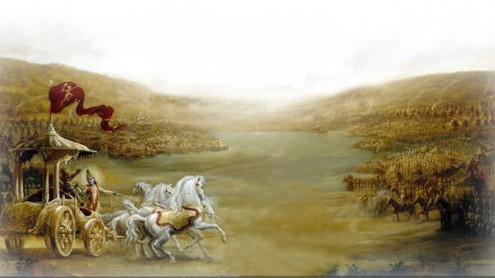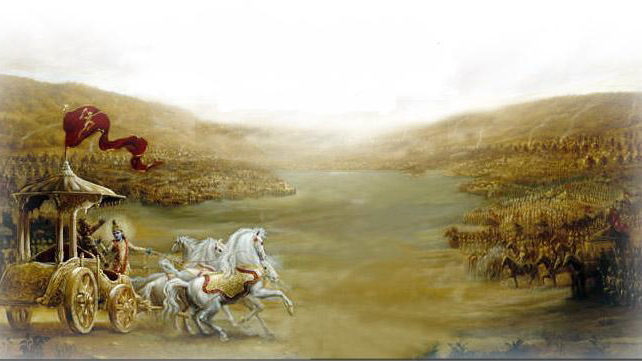
The Bhagavad Gita is an ancient Eastern philosophical literature. It presents the counsel of Krishna to Arjuna – two prominent leaders of the epic of Mahabharata. Mahabharata is the epic of the feud between two warring clans – the Pandavas and the Kauravas. Before the battle of Kurukshetra, Krishna, who is a friend and the charioteer of Arjuna, drives the chariot to the middle of the battle field, so Arjuna can observe his army and his enemies. Seeing his own kinsmen lined up against to fight him, Arjuna trembles at the thought of killing them. Krishna cajoles Arjuna, “Nothing is higher than a war against evil. A warrior such as you should be pleased with such a war, as it leads to heaven.” Krishna‘s discourses are described in the eighteen chapters of the Bhagavad Gita. At the end of his discourses, Krishna successfully convinces Arjuna to fight the battle of Kurukshetra.

The Bhagavad Gita has been predominantly studied in the contexts of philosophy, theology and literature. Many scholars believe that the Bhagavad Gita was written in as early as 3000 BC. Scholars through out the ages have studied the Gita with great interest. Scholars like Albert Einstein, Ralph Waldo Emerson, and Henry David Thoreau have quoted the Bhagavad Gita in their writings. Peter Senge, one of the most prominent management thinkers of our time, has quoted the Gita is his “Fifth Discipline” and “Presence.”This ancient text has never been studied in the leadership context. If we look closely, the wisdom of the Bhagavad Gita contains many leadership lessons that are similar to contemporary leadership theories and practices. Consider some of these lessons embedded within the Gita:
- Leaders should embrace rather than avoid formidable challenges because they bring out the leaders’ greatest strength
- Leaders should be resilient in their actions and should not be weakened by pain and pleasure.
- Selfish desires and animosity obscure the purpose of leadership.
- Leaders achieve lasting power and glory by exercising compassion and selfless service.
- Effective leaders do not lead by fear or anger.
- Character is core to effective leadership.
- Leaders need to be aware of the self and the surroundings.
Many contemporary leadership topics such as emotional intelligence, situational leadership, character and integrity were already discussed in the Bhagavad Gita thousands of years ago. These topics were discussed in a philosophical context, as management science as we know today did not exist then. It is also intriguing to find other management concepts embedded in the Gita. Thousands of years before Frederick W. Taylor defined work and worker, and Peter F. Drucker defined knowledge and knowledge worker, the topics of work and knowledge were already in the Bhagavad Gita.
Among many leadership lessons the Bhagavad Gita has to offer, two concepts stand out more prominently, and deserve a closer examination. These concepts are discussed below.
First Know Thyself
The Bhagavad Gita suggests that leaders cannot lead effectively unless they know their own selves. The understanding of the self is not only about understanding our physical and psychological states. This understanding goes further down to our deepest levels of consciousness. According to the ancient Vedic wisdom of the East, the human consciousness is not limited to our physical and psychological states, but it extends much farther. Psychologists suggest that the deeper level of consciousness is exemplified by our dream experience. When we dream, we can[pullquote]O son of Prtha, there is no work prescribed for Me within all the three planetary systems. Nor am I in want of anything, nor have I a need to obtain anything — and yet I am engaged in prescribed duties. – Krishna in Bhagavad Gita 3.22[/pullquote] hear voices and see colors, but these perceptions are not tied to our physical senses. Further levels of consciousness can be understood by going into a deep meditative state. When we meditate, we experience absolute stillness. Many define this state as the state of nothingness – something that has no physical dimension to it. People who have mastered meditation tell accounts of other-worldly experience when they are in a deep meditative state. Scientists have found remarkable psychological and physiological improvement of the human body when the mind is in a meditative state.Why is meditation so important in this context? The ancient wisdom suggests that our true potential and purpose can be realized by understanding our true selves – the quantum level of our existence. Many wisdom traditions refer to this level as the soul. The potentiality of our quantum self is analogous to the scientific developments we have witnessed in the past century: science was able to achieve more when scientists were able to understand it at the quantum level. The Bhagavad Gita suggests that we can find our true potential and purpose by understanding our quantum self. The same principle applies to leadership. We can become effective leaders when we understand our quantum self. Today, we understand leadership as something that is not only about leading a nation, a corporation, or a big entity, but it is about influencing and guiding others. Leadership is about helping others to find their potential and purpose. According to the Bhagavad Gita, it is not possible to become an effective leader if the leader does not understand his or her own self, and does not understand his or her own potential and purpose.

The Bhagavad Gita recommends meditation to connect to our true selves. Meditation is the state of being in peace with our inner selves regardless of our physical state, events, or surroundings. By meditating, we tap into the vast amount of energy that is available to us simply by connecting to the deepest level of our existence. Again, this is very analogous to the scientific developments. No one can argue now that atomic energy is more potent than anything else known in this world. The atomic or quantum level of our existence has the same potential, according to the ancient wisdom of the East. By harnessing the potential of our quantum self, we can understand our potential and purpose in this world. This knowledge is essential if we wish to be effective leaders.
The Bhagavad Gita also suggests that true meditation is not possible without practicing good discipline and developing a good character. In other words, true potential and purpose is not possible without good discipline and good character. This is an important topic in today’s world when leadership is tainted by unethical and immoral issues. In its eighteen chapters, the Bhagavad Gita repeatedly talks about developing a sattvic character. In Sanskrit, sattvic is righteousness. The Gita defines sattvic as the character of harmony and purity. Sattvic character radiates peace and happiness. It offers selfless service and has a high level of emotional intelligence. Without a high level of emotional intelligence, the Gita suggests that we cannot attain a true meditative state. If we become victim of our own emotions, we cannot lead an effective life, let alone lead effectively. Today’s leadership authorities also suggest that effective leadership flourishes only when leaders have a high level of emotional intelligence. Emotional intelligence, abbreviated as EQ, is a discipline of understanding our selves, especially the emotions that brew in our mind. EQ is the awareness and ability to manage our emotions in a healthy manner.
In the Bhagavad Gita, Krishna defines three specific disciplines that are required for effective leadership: discipline of learning, discipline of speaking properly and discipline of equanimity. All of these disciplines are important for effective leadership. Today’s leadership authorities also agree that effective leaders have to be effective learners. Leadership is not only about teaching people to follow a certain path or to do a certain thing, but it is also about learning things to be taught.
Likewise, without effective communication skills, leadership cannot become effective. Krishna says, the most important part of communication is to communicate with honesty and with respect toward others. For leaders to be effective, they must be able to motivate their followers when they speak, so they can guide them toward the common vision and goals. Leaders like Gandhi, Dr. King and Kennedy became known as effective leaders mainly because they communicated elegantly at all times. In the business world, we know leaders like Jack Welch, Andy Groves and John Chambers as great communicators. When these leaders communicated to their followers, they were always consistent on the vision and goals they presented to their organizations.
The discipline of equanimity suggests that we have to keep steady composure at good and bad times. The Bhagavad Gita says that we should not be overtly excited in good times and overtly depressed in bad times. Keeping a composed mindset at all times helps us to achieve more peace and happiness in our lives.
Renunciation – the ultimate leadership challenge
The eighteenth chapter of the Bhagavad Gita culminates with an important lesson for effective leadership; this lesson is about leadership renunciation. The Gita defines renunciation as abstaining from selfish acts (sanyasa in Sanskrit) and detaching from the results of an action (tyaga in Sanskrit). Krishna mentions specific areas where true renunciation must be practiced, such as:
- Renounce negative thoughts, words, and actions
- Renounce inequality and promote equality
- Renounce selfish desires and exercise selfless service
- Renounce indiscipline, dishonesty, and lazy attitude; and exercise integrity and proactive-ness
- Renounce arrogance and ignorance, and be open-minded
- Renounce momentary happiness that is derived from selfish behaviors. Instead, seek happiness that is long-lasting and beneficial to all.
The definition of renunciation, according to the Bhagavad Gita, suggests that leaders must practice selfless giving and strive for the common good. This concept is ironic in today’s context as leadership in general is shrouded with deceit, dishonesty and selfish acts. We hardly see leaders who sacrifice their authority, position and incentives for the benefit of their people. Many leaders lure their followers with hefty promises only to be forgotten once they capture their leadership positions. Many leaders promise prosperity only to lose focus on people and their well-being.
Practicing renunciation requires focusing on people and demonstrating compassion toward them. Today, we know servant leadership as a popular leadership concept. Servant leadership is similar to the concept of leadership renunciation. Servitude and compassion enable leadership renunciation, and also enable effective leadership.
In the Bhagavad Gita, Krishna defines the meaning of true renunciation. He says, true renunciation is one that is undertaken with courage and without selfish attachments. By acknowledging one’s responsibilities and doing everything in his or her capacity to fulfill those responsibilities, a person performs a true renunciation. When leaders acknowledge their responsibilities, there is no judgment of the nature of work. They do not worry about the pleasantness or unpleasantness of the nature of work. This is true leadership renunciation according to Krishna in the Bhagavad Gita.
Krishna also explains that not all renunciations are true and meaningful. He says, to abstain from one’s responsibilities is called a deceptive renunciation. Shying away from one’s responsibilities over apprehension and anxiety is not a meaningful renunciation.
If we look at the lives of effective leaders, they have demonstrated these characteristics. Mother Teresa left her homeland to serve the poor people of India. Dr. King spent his entire lifetime advocating racial harmony. Albert Schweitzer left a good life in France to serve the poor people in Africa. Henry Dunant gave up his wealthy business to serve the war victims, and established the Red Cross movement. Nelson Mandela spent twenty seven years in prison to fight against South African apartheid. The fourteenth Dalai Lama became the messenger of world peace and harmony while remaining in exile away from his homeland Tibet.
In the business world, there are a few exemplary leaders who have demonstrated leadership renunciation. In 1995, a large fire destroyed the Malden Mills – a privately held fabric mill based in Massachusetts. Aaron Feuerstein – the owner of the Malden Mills could have retired lavishly with the money he had received from the insurance payout. Instead, he decided to rebuild the factory while keeping all employees on the payroll. Lee Iacocca – the former CEO of Chrysler – cut his own salary to $1 per year in order to reduce the financial burdens of his company. More recently, Bill Gates of Microsoft and Warren Buffet of Berkshire Hathaway gave away billions of dollars of their personal wealth for philanthropical causes.
The leadership lessons of Krishna, as described in the Bhagavad Gita, attest that the subject of leadership was profound in the ancient East and its principles are still applicable to business and organizations today.
Author: Pujan Roka(www.pujanroka.com) is the author of “Bhagavad Gita on Effective Leadership: Timeless Wisdom for Leaders.”
